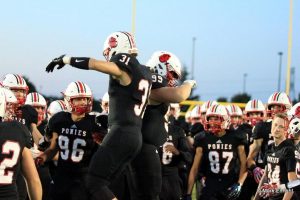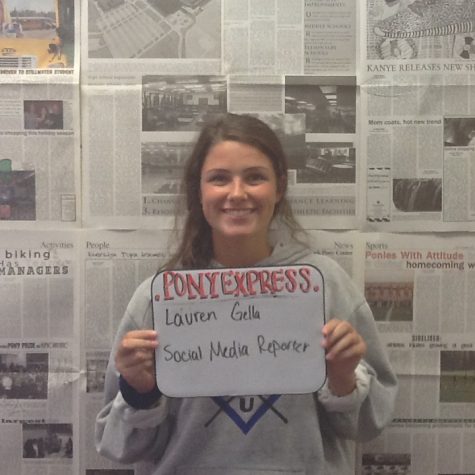Locker rooms inappropriate for interviews
February 20, 2017
Athletes being interviewed in their locker room directly after their game is the last thing athletes want to happen. Whether it’s celebrating a victory or mourning a loss, being interviewed is not on the athlete’s list of things to do directly after a sports event.
There are many reasons to believe the locker room of a sports team is not the best environment for a reporter to speak with their interviewee. Athletes play their sport for a reason: they love it, which means the athletes are filled with emotion during/after an event.
There have been many cases where athletes refuse to speak with reporters in locker rooms directly after a game because the athletes are so emotional about a loss that they do not want to open up to a stranger or the media about their feelings. In many situations, when athletes are being interviewed directly after a game, specifically a loss, the athlete is looked at as a bad person because they are so emotional about the loss that they tend to come off as rude to the reporter or refuse to speak to the reporter all together. On the other hand, if the athlete is celebrating a victory, the athlete may be so caught up in the moment that they may not give a thorough answer to the reporter’s question.
Antonio Brown, NFL player for the Pittsburgh Steelers left Gillette Stadium without speaking to a reporter for a set up interview because he was upset about a loss. An article on foxsportsradio.com wrote, “Not only is he required to do so, but by skipping out and leaving his teammates behind to face the cameras he lacked the accountability for his own actions.”
If media reporters weren’t allowed into athlete locker rooms after games, the amount of athletes looked at as rude or disrespectful would decrease greatly. Brown was upset about the loss and did not want to speak to anyone about his experience and for that he was made into a monster by the media when in reality, Brown is an incredible athlete who cares very much about the game of football.
A similar situation took place with Micheal Bennett, a defensive player for the Seattle Seahawks. Bennett blew up at a Seattle reporter when interviewed in the locker room. Bennett using words like “obviously” and “shit” when asked about the game that was lost to the Atlanta Falcons that ended their season by a reporter, was also viewed as a monster to the media all because he was emotional about the loss of a game he loves so much.
Gregg Bell, writer for The News Tribune wrote, “A player explodes in the locker room at a member of the media minutes after his season just ended…not appropriate or commendable, but understandable. This is a sport where emotion, testosterone and sacrifice are expended so rawly and extensively.”
The athlete is going to explode when asked about the mistakes they have made in the one area of life that they care about the most. It’s time to stop the media and the public from portraying athletes as bad people because they care so much about sports.
Senior Claire Knowlan, captain of the Stillwater girls hockey team shares similar emotions with Brown and Bennet after losses. “I feel really disappointed because a lot of the time we give it our all but it doesn’t go in our favor. I wouldn’t want to talk with a reporter because the emotions are running high. I need time to digest what had just occurred.” said Knownlan.
Athletes being exposed while at their worst isn’t just happening in programs such as the NFL. These situations are happening in our own school and it’s time to make a difference.
Junior Carley Milanovich, who has been a dancer for 11 years and has had a designated place to change from costume to costume said, “It’s kind of weird that reporters go in the locker room. Like that’s just weird.”
Junior Isabelle Lombardi, who plays on the Stillwater girls lacrosse team said, “They shouldn’t see people changing because that would make them [reporters] uncomfortable.”
The idea that athletes aren’t fully clothed 100 percent of the time in locker rooms, and reporters are seeing these players half-naked at times is also a great reason to end the reporters in locker rooms controversy.
Distractions are also a major factor when interviewing athletes in a locker room because the athlete may not give the best answers to the reporter when so many things are going on in the locker room around them.
Milanovich said, “I think they should just wait until the athlete is out of the locker room so they have time to cool down.”
Lombardi said, “The players won’t even give a good interview if they’re distracted by their team being around.”
Locker room interviews and whether or not they should be allowed has been a controversial topic for many years. Because athletes are so emotional, distracted and may be half naked are just a few reasons why there should be a stop to reporters being in locker rooms with athletes. Here’s some advice to reporters our there: find a different time to interview athletes about their games.













Dreks • Nov 11, 2018 at 7:29 pm
These kids have more common sense, dignity, and maturity than the entirety of both the sports and media industry.
Well spoken, well done.
Hunter Hippel • Mar 27, 2017 at 7:15 pm
I thought this article was really well done. It was smartly written and said why athletes sometimes lose their minds in interviews.